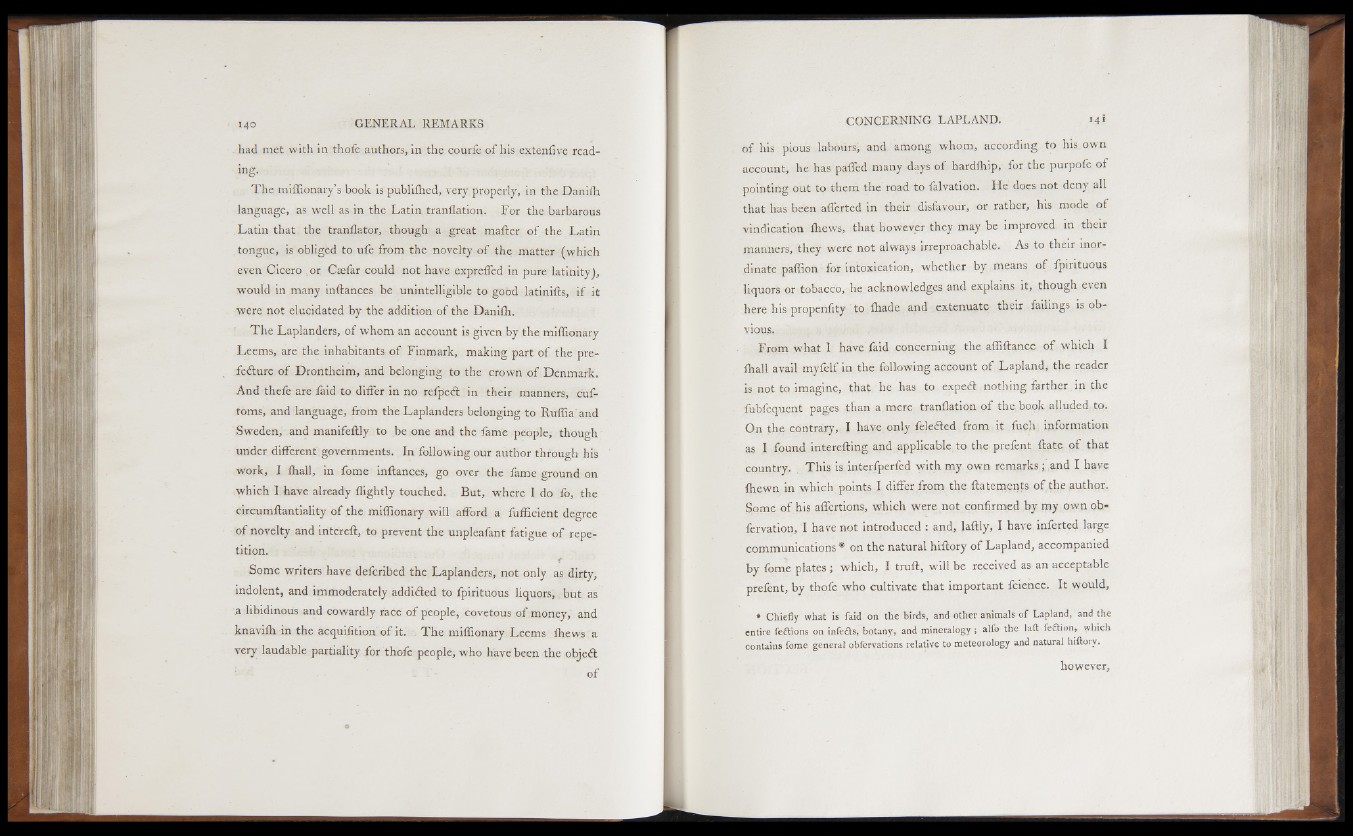
had met with in thofe authors, in the courfe of his extend ve read-
ing.
The miffionary’s book is publiihed, very properly, in the Daniih
language,, as well as in the Latin tranilation. For the barbarous
Latin that the tranflator, though a great mailer of the Latin
tongue, is obliged to ufe from the novelty of the matter (which
even Cicero or Casfar could not have expreffed in pure latinityj,
would in many inilances be unintelligible to good latiniils, if it
were not elucidated by the addition of the Daniih.
The Laplanders, of whom an account is given by the miffionary
Leems, are the inhabitants of Finmark, making part of the pre-
fedure of Drontheim, and belonging to the crown of Denmark.
And thefe are faid to differ in no refped in their manners, cuf-
toms, and language, from the Laplanders belonging to Ruffiaand
Sweden, and manifeilly to be one and the fame people, though
under different governments. In following our author through his
work, I ihall, in fome inilances, go oyer the fame ground on
which I have already ilightly touched. But, where I do fo, the
circumilantiality of the miffionary will afford a fufficient degree
of novelty and intereil, to prevent the unpleafant fatigue of repetition.
r
Some writers have defcribed the Laplanders, not only as dirty,
indolent, and immoderately addided to fpirituous liquors, but as
a libidinous and cowardly race of people, covetous of money, and
knaviffi in the acquiiition of it. The miffionary Leems ihews a
very laudable partiality for thofe people, who have been the objed
. . - of
of his pious labours* and among whom, according to his own
account, he has paffed many days of hardihip, for the purpofe of
pointing out tq them the road to falvation. He does not deny all
that has been afferted in their disfavour, or rather, his mode of
vindication ihews, th a t however they may be improved in their
manners, they were not always irreproachable. As to their inordinate
paffion for intoxication, whether by means of fpirituous
liquors or tobacco, he acknowledges and explains it, though even
here his propeniity to. {hade and extenuate their failings is obvious.
From what I have faid concerning the affiitance o f which I
ihall avail myfelf in the following account of Lapland* the reader
is not to imagine, that he has to exped nothing farther in the
fubfequent pages than a mere tranilation of the bopk alluded to.
On the contrary, I have only feleded from it fuph. information
as I found intereiling and applicable to the prefent {late of that
country. This is interfperfed with my own remarks ; and I have
{hewn in which points I differ from the ilatemeqfs of the author.
Some of his affertions, which were not confirmed by my own ob-
fervation, I have not introduced : and, laftly, I have inferted large
communications * on the natural hiilory of Lapland, accompanied
by fome plates ; which, I truft, will be received as an acceptable
prefent, by thofe who cultivate th a t important fcience. It would,
* Chiefly what is faid on the birds, and other animals of Lapland, and the
entire feftions on infeits, botany, and mineralogy; alfo the laft feftion, which
contains fome general obfervations relative to meteorology and natural hiftorv.
however,